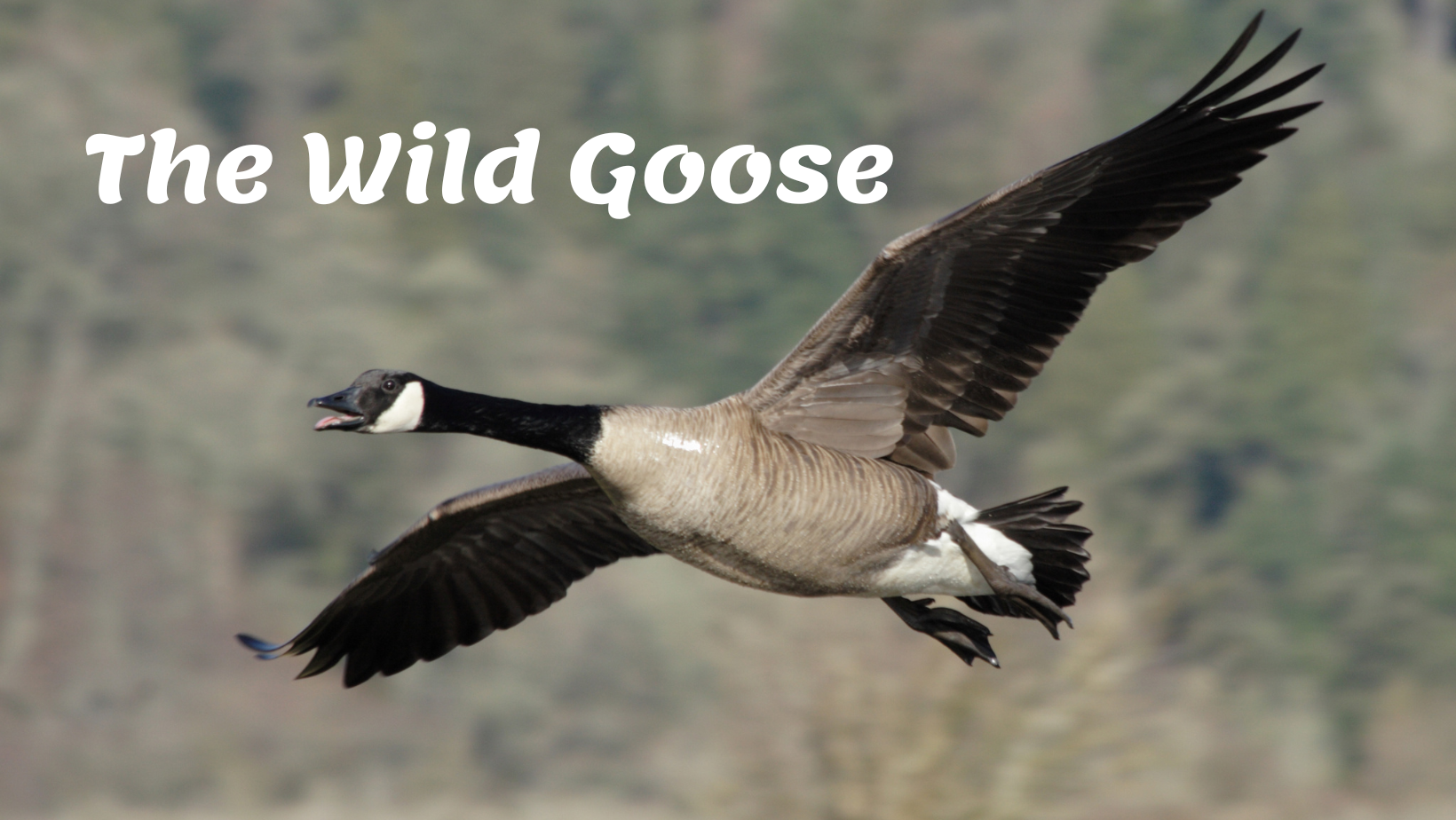9-7-2022 The Wild Goose
Several years ago, I had the joy of traveling to Ireland. In my preparations to visit and to teach a class on Celtic Christianity, I learned that the ancient Celtic symbol for the Holy Spirit was the wild goose. During my recent Celtic Pilgrimage to England, I learned more about the Wild Goose. It’s not that the Celts did not know the scripture or know of the dove. But Celtic Christians decided the wild goose was a far more apt symbol of the Holy Spirit.
I like the image because geese are wild, untamable, and uncontainable. On the day of Pentecost, the Spirit came like fire and wind and gave the disciples the ability to speak in the language of those gathered so people could understand them. Some people said the disciples must be drunk. What was happening was so unexpected, so surprising, that they couldn’t make sense of it. People were moved to awe. It was new, it was creative, it was wild. And it captured their imaginations as 3,000 people came to the Lord.
But geese also have an everyday, ordinary way about them. They are everywhere, so we see them often. They are part of everyday life, reminding us that the Spirit is not out there somewhere but with us, in us, and working all around us. What is needed is a growing awareness to recognize the Spirit’s presence. But, like geese, the Spirit doesn’t stop for us to notice, to catch up. It just keeps moving. Keeps heading in a direction ordained from the beginning of time.
As fall begins and I head into my last season of ministry at VPC, I have decided to study and teach on the Holy Spirit in the Women’s Bible Studies, which begin Monday, September 19, at 7:00 p.m., and Tuesday, September 20, at 9:30 a.m. There is much to learn about who the Holy Spirit is and how the Wild Goose leads and empowers us for our lives and ministry in the world.
In his book Streams of Living Water, Richard Foster talks about the Spirit-empowered life and a need for “ongoing correction to our impulse to domesticate God. We have a perennial tendency to manage and control the work of the Spirit. We want a nice, tidy God. But as Jesus reminds us, the Spirit blows where he wills (John 3:8). This is actually a great grace, for it reminds us that God is in charge of this enterprise, and that he is alive and active in our world. The moment we feel that we have the spiritual-life business all figured out, God surprises us with outbreaks of the Spirit we could never have imagined. All our little attempts—both personally and historically—to institutionalize the Holy Spirit ultimately fail. For this, we should thank God. How much better to move day by day in joyful surrender to the leading of the Spirit, in which ‘the soul, light as a feather, fluid as water, innocent as a child, responds to every movement of grace like a floating balloon.’”
The Holy Spirit is the presence of God with us who is powerfully at work in, for, and through us to transform, unite us in community, and use us in continuing Jesus’ life and ministry in the world. Understanding and experiencing the Holy Spirit as the Wild Goose is very helpful to me in this time of transition, and I think it can be for others as well. We can learn a lot from the Celtic people, who saw themselves being led by the Wild Goose.
In his book Restoring the Woven Cord: Strands of Celtic Christianity for the Church Today, Michael Mitten writes, “In some ways, the Holy Spirit would not have had to work too hard on the Celtic peoples because they were natural travelers and explorers. Nonetheless, there was a real cost involved in pulling up roots and venturing forth, often in small rudderless coracles, at the mercy of tides, currents and winds that were used by the Spirit of God to take them to places of God’s choice The cost was reflected in the use of the word ‘martyrdom’. The Celtic church identified three kinds of martyrdom. White martyrdom was the leaving of home for the sake of the gospel. Red martyrdom meant dying for the sake of Christ…. While there were few red martyrs in the early years (of Celtic Christianity), there were thousands of ‘green’ martyrs. Green martyrdom was primarily to do with a life of confession and penance, which included a voluntary giving up of normal security. Many therefore felt a sense of calling for white and green martyrdom and this in part contributed to the desire to leave one’s secure home to become what was called a perigrinatus, a wanderer (on pilgrimage) ‘for the love of God…for the name of Christ…for the salvation of souls and to attain heaven…. The Celtic church reminds us that we were born to quest and that pilgrimage is at the heart of our Christian discipleship.”
I like the ways David Adams explains this further in his book The Open Gate: “As long as we are alive, we are on the move. To become static is to stagnate and die. It is necessary for all living things to move and grow and change. Life is meant to be an adventure; change is a gift that we have to learn to use aright. In Celtic folk tales a curse that could happen to a person was to enter a field and not to be able to get back out of it. To be stuck in that place forever. It was seen as a definite curse to be unable to venture or to change. The open gate is the opposite to this. It is the invitation to adventure and to grow, the call to be among the living and vital elements of the world. The open gate is the call to explore new areas of yourself and the world around you.”
I am facing an open gate. I don’t know where it will lead. I can’t deny that it is stressful because I’m leaving the familiar and known for what is unfamiliar and unknown. But remembering that I am and will be led by the Wild Goose helps me remember who I am—a wanderer, for the sake of Christ. I am trusting God will get me where I need to be to minister out of my truest and best self for his glory, the good of his people, and to reach others for Christ.
Most of you may not be changing locations, but all of us are called to have a spirit of adventure and to see ourselves on pilgrimage. In this season of change in our church, each of us is called to follow where the Wild Goose is leading us to live and minister for the love of God, the sake of Christ, and the good of others. Each of us has to discern the “adventure” God is calling us to that requires living by faith.
In the midst of change, it’s important to remember to fix our eyes on Jesus who was a wanderer himself in his earthly life. His journey ultimately led to dying on a cross and vanquishing sin and death through his resurrection. He made clear that those of us who follow him must take up our crosses daily in whatever ways he calls. The first disciples were faithful to do this—both figuratively and literally. As they were led by the Wild Goose, they witnessed to the Lord Jesus in word and deed. God used them to turn their world upside down.
The Holy Spirit is present and at work, and he wants to change us individually and corporately and to use us in participating in Jesus’ ongoing work in the world. While there may be some trepidation not knowing all that is ahead, I’m trusting and praying the Wild Goose will lead me and you on the adventure he has for all of us—wherever it will lead. God is always faithful!


